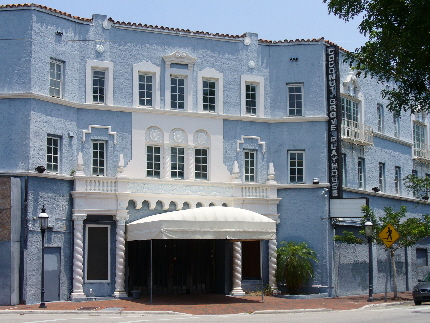 By Bill Hirschman
By Bill Hirschman
A citizens’ group that pushed for 14 months for a larger, more ambitious complex for the Coconut Grove Playhouse resurrection project has shelved its plan indefinitely because the Miami-Dade County administration opposes the idea, the group’s leader said Thursday morning.
Instead, the new Playhouse likely will be built as a 300-seat theater operated by the existing regional company GableStage with space devoted to theater classes provided by Florida International University, county documents indicate.
The county commission is slated to meet next Tuesday to consider two crucial pieces: approve a $2.398 million master plan-design-consultant contract with Miami-based Arquitectonica International Corp., and a 25-year agreement with GableStage to manage the theater with options stretching out to 2113.
County officials have worked to restore a nationally-recognized theater facility on the site of the deteriorating 1926 edifice ever since the Playhouse’s non-profit board of directors locked the doors in 2006 in a $4 million bankruptcy. The county commission has committed $20 million in dedicated bond funds for the project contingent on not spending one more dime.
But last summer, a more ambitious parallel plan was unveiled by the Coconut Grove Playhouse Foundation, a community group founded by Coral Gables attorney and arts activist Lewis “Mike” Eidson.
The Foundation had quietly gathered verbal support and financial resources toward an additional overriding component – a 750-seat theater operated by a new umbrella organization, to be built with and funded totally with private donations predicted between $35 million and $45 million.
But Eidson confirmed that key administration figures said in a Tuesday meeting that the Foundation’s plan was irredeemably flawed in several respects — and that they would not recommend it.
County officials do doubt the feasibility and viability of the proposal, agreed Michael Spring, senior advisor to the mayor and director of the Department of Cultural Affairs.
But Spring said Thursday that the more pressing problem is that the Foundation plan would require renegotiating the current long-term lease with the State of Florida, which owns the property – a process that would involve another nine months of work.
Additionally, the Foundation plan is not detailed enough to satisfy the state’s requirements such as a specific business plan, Spring said. Eidson countered that he could develop those details in a reasonable period but he would not do that without the county’s written support of the overall intent of the Foundation’s vision.
Spring said, “I told him you don’t have a board of directors, you don’t have a paid staff of professionals, the individuals who would do the work and it may sound unfair but you don’t have a track record” all of which GableStage has and which the state wanted documented for the current lease with the county. “So I said, ‘Mike, I don’t think the county could recommend an amendment to the lease. I don’t think it would meet the test.’ ”
Eidson underscored that he was not criticizing anyone, but he felt misled and blindsided by county officials. He said he believed Mayor Carlos Gimenez and others had told him that they were receptive to the plan if he could – as he believed he could – raise money for the extra architectural fees and the construction. He had thought Tuesday’s meeting was meant to finalize a “memorandum of understanding” on paper to reaffirm the county’s willingness to build the Foundation’s vision.
Instead, Eidson said, the county delegation led by Spring told him that he had misunderstood what they had said earlier.
Eidson said, “We thought we had a deal: That if we raised a certain amount of money by a certain date we would be included in the project.” Spring responded Thursday night that as the Foundation’s plan had evolved, the problems and deficiencies became clearer.
At the end of the 75-minute meeting Tuesday, Eidson said he was not walking away but “sort of standing down” because the administration’s opposition meant he “had nowhere to go…. I don’t feel like I’m quitting anything. I just don’t feel like there is anything I can do.”
GableStage’s Producing Artistic Director Joseph Adler said Thursday that the Eidson decision did not technically change anything. “We’re going to move as if none of this happened. We’ll be there (at the commission meeting) and hopefully our supporters will be there and hopefully we’ll get the green light.”
Eidson, who has chaired the Adrienne Arsht Center’s Trust for five years and led the Miami City Ballet for nine years, said he had spent about a quarter-million dollars of his own money on the project. He enlisted colleagues in the arts community and drummed support among hundreds of arts patrons, business people and residents of the Grove where he has lived for many years. The project plays into some Grove residents’ hope for a continuing revitalization of the city as an entertainment and shopping mecca.
The Foundation commissioned a study ultimately endorsing the feasibility of the project including cost estimates and the results of visits to five regional theaters around the country. It also included a survey of residents about their receptivity to the kind of programming that the Foundation envisioned – a return to the big-budget mainstream plays and musicals with boldface name performers that dominated the Playhouse schedules through much of its lifespan.
Edison said, and Spring confirmed, that county staffers read that report but termed it flawed.
Technically, the idea of a two-theater complex is not completely ruled out permanently. The architect will develop a master plan that includes the larger theater as an option in the future. Eidson also left the door a bit ajar, even suggesting that his extensive feasibility study provides information for any such project. But the county commissioners will not spend any more money – funds essential for an expanded vision.
Before this week, some people had been critical of the county’s seeming reluctance to consider Eidson’s innovative vision. Others had said that Eidson was unrealistic, that the market no longer exists for what he envisioned, and, in any case, he entered the process far too late to avoid endangering something being built at all. Eidson challenged that this is a perfect opportunity for Miami-Dade to take its place as an internationally-renowned destination for theater.
The Playhouse has been closed since 2006 – its 50th anniversary season. That invalidated the Playhouse’s lease with the state, which had taken ownership of the property in 1980.
Starting out as a movie theater in 1926, the building has played a major role in Florida cultural history. The edifice on the southwest corner of the Coconut Grove business/entertainment district has been repeatedly remodeled under several ownerships while becoming one of the nation’s leading regional theaters that emerged after World War II. Producers like Zev Buffman, Robert Kantor, Jose Ferrer and, after 1985, Arnold Mittelman mounted their own shows, hosted national tours and even provided a home for works being developed for Broadway.
The shows and the performers reflected a time when fading stars and supporting actors in film and television were able to headline major stage productions that they would never have the chance to attempt in New York. Some were triumphs and many were flops. Some were unadventurous fare; others reflected the latest thought-provoking hit from Broadway. In a few cases, Broadway-bound productions were developed at the Playhouse.
Among the legendary productions was the first American version of Waiting For Godot, starring Tom Ewell and Bert Lahr, an evening that left many playgoers confused because it wasn’t the comedy those stars were usually seen in.
The Miami-Dade County Commission will vote on the Grove issues at their regular meeting Tuesday at the Stephen P. Clark Center, 111 NW 1st Street, 2nd Floor. The meeting starts at 9:30 a.m. but there is no way to know when the item will be considered.







 A PaperStreet Web Design
A PaperStreet Web Design
